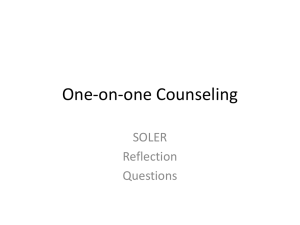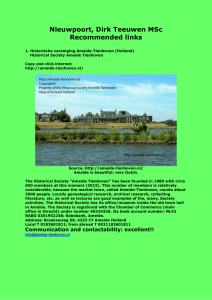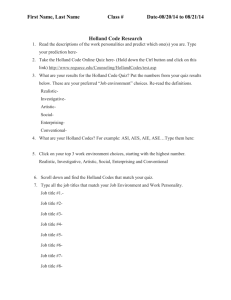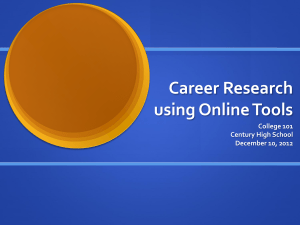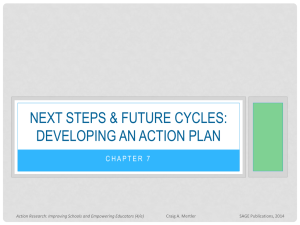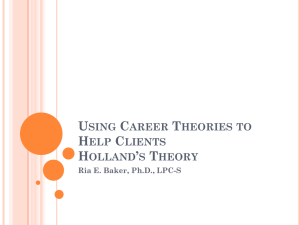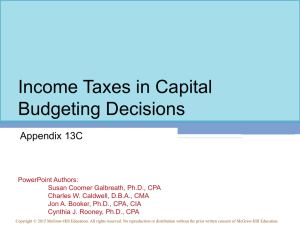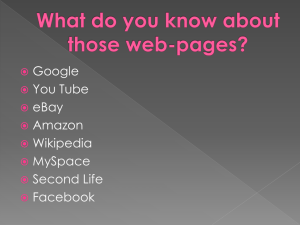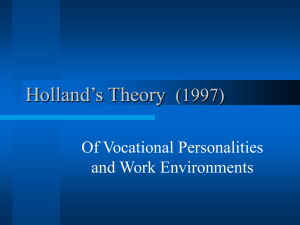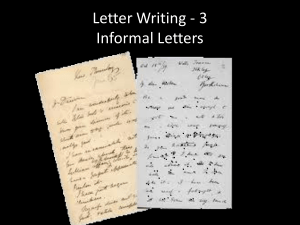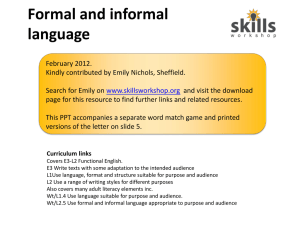Assessment
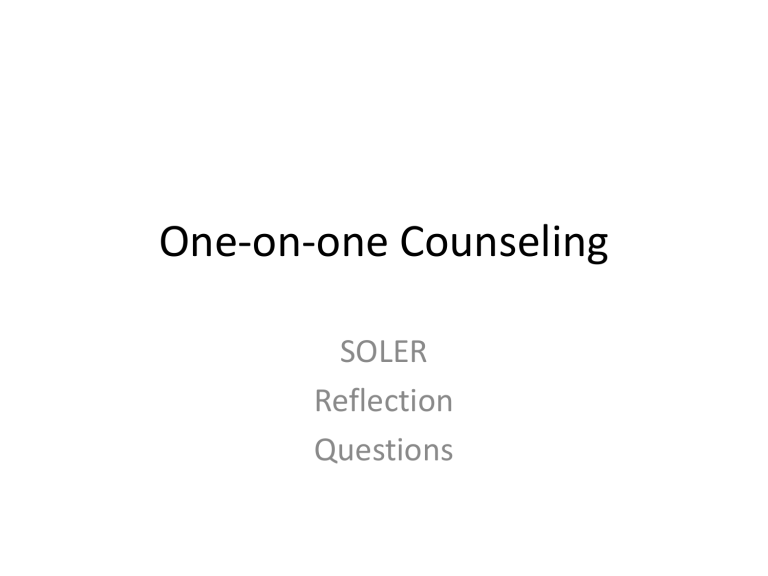
One-on-one Counseling
SOLER
Reflection
Questions
Performance Objective
At the end of this lesson you will be able to:
list and describe the foundational principles of one-on-one facilitation.
define and describe advantages and disadvantages of openand closed-ended questions.
define and describe the skills of reflection and questioning in an interview.
describe the diverse groups that make up job seekers and ways to enhance communication effectiveness.
Basic Principles of Facilitation
Genuineness
Understanding
Acceptance
Empathy
Respect
Trust
One-on-One facilitation
• S - Square up to client to display undivided attention
• O – Open posture
• L – Lean in
• E – Eye contact
• R - Relax
Reflection
Mirrors both the
content and feeling
Closed-Ended Questions
Advantages
• Easy for job seeker to answer
• Yield or clarify information quickly
Disadvantages
• Restrict job seekers to brief answers
• Keep the questioner in control
• May provide less information
• May feel like an interrogation
• Heard as advice or criticism
Open-Ended Questions
Advantages
• Invite job seekers to explore thoughts/feeling
• Gives some control
• Convey interest and respect
• Provide unexpected information
Disadvantages
• Allows job seekers to wander from topic and lose focus or avoid topics
• Leads to a series of “I don’t know” answers
Initial Interviews
• Mixture of feelings: suspicion, fear, tentativeness, resentment
• Concern about fairness
• Concern about expectations
Initial Interviews
Convey interest and respect
Use open-ended questions to explore
Use closed-ended questions to clarify
Use reflection to demonstrate listening and understanding
Using 1-on-1 counseling
Skills
Performance Objective
At the end of this lesson you will be able to:
determine the difference between formal and informal assessments.
define and describe advantages and disadvantages of open- and closed-ended questions.
Develop a structured interview template using the
Wheel.
Experience two examples of career theory-based informal assessment tools.
Assessment
• Developed w/o scientific rigor
• Has no known reliability
& validity
• Administered informally
• Interpreted in a nonstandardized way
• Developed with scientific rigor
• Has known reliability & validity
• Administered in a standard, specific way
• Interpreted in a standardized way
Informal Assessment
Low cost
Can be administered w/o ordering materials
Can offer greater opportunity to learn about person taking assessment
Informal Assessment
Interpretation may be subjective
Facilitators may interpret the same results differently
Activities have not been subjected to scientific study
Informal Assessment
Types
•Forced-Choice Activities
•Card Sorts
•Checklists
•Structured Interviews
•Simulations (games)
Structured Interview
One-on-one conversation in which the facilitator’s part of dialogue is preplanned
Checklist
Choosing items from a list that indicates preferences or personal characteristics
Interests & Skills Checklist
• Complete questionnaire about interests and work experiences
• One completed, tally scores for all six categories
• Draw profile
• Join in group discussion
Performance Objective
At the end of this lesson you will be able to:
• describe the differences between Structural and
Developmental Career theories.
• determine your own Holland Code and explain what it means.
• identify the primary elements RIASEC
• define the term vocational self concept
Structural Career Theories
Individual
Traits
Job Traits
Job
Success
Developmental Career Theories
Socioeconomic
Factors
Personal
Characteristics
Career
Patterns
Mental/Physical
Abilities
Life
Expectancies
Definition of Career
A combination of activities in all life roles at a specific point in time (lifespan)
John L. Holland
Concept 1: People can be described as a combination of six personality types
– Realistic
– Investigative
– Artistic
– Social
– Enterprising
– Conventional
John L. Holland
Concept 2: A Holland code can be used to identify
– Occupations
– Jobs
– Schools
– Majors
– Leisure Activities
John L. Holland
Concepts 3 & 4:
– People of a given type are drawn to an environment of the same type.
– When person and environment types are matched, people are likely to be satisfied and productive.
John L. Holland
Conventional
Realistic
Investigative
Enterprising
Social
Artistic
Activity
Well-Differentiated Profile
High, Flat Profile
Low, Flat Profile
